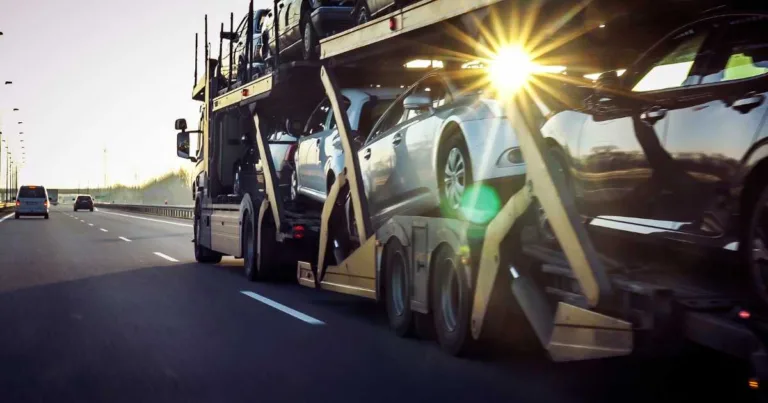Asadullah Ismailzada is the Chief Executive Officer of AmeriFreight Auto Transport, where he leads the company’s strategic vision, growth, and commitment to operational excellence. A successful entrepreneur and former legal professional, he brings extensive international and cross-sector leadership experience to his role.
He holds a Master of Laws (LLM) from Mississippi College School of Law and an Executive MBA from Georgia State University’s J. Mack Robinson College of Business, where he was honored as Student of the Year and recognized among Georgia State’s 40 Under 40 alumni.
Earlier in his career, Asadullah held senior leadership roles in the justice sector overseas, managing U.S. Department of State–funded programs that advanced access to justice and institutional reform. He also actively supports initiatives that expand educational opportunities for children worldwide.
Driven by a vision to make AmeriFreight Auto Transport the most trusted name in auto transport, Asadullah is dedicated to delivering a shipping experience built on integrity, transparency, and genuine care. Under his leadership, AmeriFreight Auto Transport continues to set new standards in customer service — making car shipping simpler, safer, and more reliable for every customer.
Edwards: What are the biggest trends you've seen in the car shipping industry in 2025?
Ismailzada: Surge in the use of technology and automation: With the rise of modern technology, the adoption of AI, changes in customer behavior, and the increase in competition, companies, including auto transport brokers, have started streamlining processes such as full digitalization of booking platforms, introducing AI-driven pricing tools, and real-time tracking capabilities.
In addition, many automobile manufacturers have produced vehicles that either have built-in GPS tracking capability or links to third-party subscriptions, allowing real-time tracking of their vehicles during transportation. Furthermore, Central Dispatch, the most prominent load board in the U.S., has created an app with built-in GPS tracking capability, enabling customers to track their vehicles in real-time.
Regulatory changes: 2025 brought about many strict changes that impacted the entire auto transport industry. Depending on the angle from which one looks at it, it contributed to potential increases in safety ratings, worsening driver shortages, and the overall rising cost of shipping. The increase in cost of maintenance, especially coupled with the rising costs of parts and labor and the shortage of parts due to government tariffs, presented a challenge in and of itself.
Insurance price hikes: Many carrier companies were impacted by the significant price increases in their insurance premiums, parts, and labor, which in turn impacted the overall cost of shipping. The auto transport industry was not an exception to this.
Global supply chain, tariff, interest rates, global political climate: In my opinion, inflation and high interest rates, coupled with the impact of tariffs raising automobile prices, and the global instability in a post-pandemic world where the global supply chain was already messed up, have contributed to customers tightening budgets and cutting spending.
Edwards: What statistic in the car shipping industry do you think would surprise most people?
Ismailzada: Most people I talked to either did not know that car shipping as a service existed or that there were a significant number of vehicles available for shipment within the U.S. or globally. There is a significant opportunity in raising awareness about the car shipping industry in general.
Customers would be surprised to see that shipping a car is actually cheaper, safer, and more convenient than driving when you factor in the time lost, the cost of gas, food and lodging, possible breakdowns with the cost of repairs and maintenance, wear and tear/vehicle depreciation, exhaustion from the long trip, and the inherent risks involved in long-distance driving.
Edwards: How do you expect the housing supply to impact car shipping?
Ismailzada: The housing market is directly related to the car shipping industry. A huge percentage of the customers in the car shipping industry are those who move from one state to another. As a rule of thumb, the higher the sales volume in the housing industry, the better it is for the car shipping industry.
Edwards: How are economic conditions, like inflation and housing market fluctuations, impacting car shipping demand?
Ismailzada: Inflation reaches people’s pockets, impacting their purchasing power, discretionary budget, and spending power. Inflation can lead to people not having the option to make the purchases they would like to make, as they will be forced to make ends meet.
This is especially true given the fact that the interest rates are high, and the housing prices are at their highest ever, making it hard for people to upgrade homes or vehicles. This, in turn, means less movement and a drop in car shipping demands.
Edwards: What is the biggest myth people have about car shipping?
Ismailzada: That shipping a car works just like shipping a package with FedEx or UPS.
Edwards: What’s the biggest mistake people make when hiring a car shipping company?
Ismailzada: Not researching properly: We hear time and time again from customers who were burned by companies making unrealistic guarantees and promises. These guarantees could be about the timing of pickup and delivery, price, GPS tracking capabilities, and more.
At AmeriFreight, we say what is true regardless of whether or not the customer ‘likes’ to hear it. For example, if the carrier promises to deliver within 7–10 days, we will always say ‘7–10 days’ even though we know the customer wants to hear a guaranteed promise of seven days.
Edwards: Has the rise of AI and automation changed the way auto transportation companies operate?
Ismailzada: Absolutely! The rise of AI and automation has significantly impacted the car shipping industry this year. The most prominent areas include AI-powered pricing tools, AI-powered virtual customer service chatbots, predictive analytics for pricing, routes, and schedules of loads, optimized software and CRM (Customer Relationship Management) integrations, and security enhancements for fraud detection and risk management.
The overall impact of it ensures enhanced efficiency and effectiveness in the auto transport industry.
Edwards: Is AI helping with logistics, scheduling, or customer service in the car shipping industry?
Ismailzada: Yes, it does. Some examples include AI-powered chatbots, GPS tracking, CRM systems, and plugins that automate pricing and communications.
Edwards: How is your company keeping itself a leader in the car shipping industry?
Ismailzada: We understand that AI is at the forefront of everything we do nowadays, but we will never forget that we are serving real humans, and nothing can replace the human-to-human rapport necessary for building trust.
We are continually working to improve all our tools, bringing technology to the forefront of our operations.
We believe in adding value to the industry as a whole by demystifying the car shipping process and educating customers one person at a time. In addition, we have launched content that helps those who may not be familiar with this industry, and that it is, in fact, better to ship a car than drive it long distances.
While others might be focused on increasing profit, we are always putting customer experience and reductions in shipping costs to the customer above all else. Profit will follow.
To us, relationships are the cornerstone of everything we do. This includes our team, customers, marketing partners, and the carrier companies. We are accustomed to hearing carriers say, “thank you for treating us with respect,” and we will continue to improve our partnership experience because we recognize that we are all interdependent, and we believe that’s how it should be.
Edwards: What makes Amerifreight different from competitors in the car shipping industry?
Ismailzada: Employee satisfaction: We believe that at the core of our success is our team. We will do everything we can to take care of our team because ‘happy employees translate into happy customers.’
Improving customer experience: Just like our employees, every customer is important to us. In other words, our customers are not numbers for AmeriFreight. They are real humans with a need, probably at a time when stress is high due to either moving to a different state, sending a loved one to college, or our men and women in the armed services answering the call of service, or similar circumstances. We meet every customer where they are and offer them service the way we ideally want to be served.
Transparency in operations: We will say what the whole truth is, not what the customer wants to hear. We want to educate customers on the car shipping process to ensure they are making an informed decision. Even if they don’t use our service, we paid it forward and did our part in serving the customers. Most do choose us because they see our passion for serving people.
Discounts and cost saving strategy: Being in business for over 20 years, we have seen it all. We have crafted a true and tested method for helping customers save money, ensuring that cheaper does not always translate to sacrificing on quality.
We have saved customers a lot of money in the years we have operated and will continue to do so for many years ahead of us.
And finally, yes, we do offer door-to-door service (location permitting), nationwide service, no upfront payments, GPS tracking for carriers using Central Dispatch App, a variety of shipment options including open, enclosed, classic, luxury car, boat, and motorcycle shipment — and we are one of the only companies with over 20 years of experience in this industry.
Edwards: What is the top thing your customers say they like about your company?
Ismailzada: Our customers like our discounts and the reliability of service at the lowest price. We have proven that cheaper does not always mean sacrificing quality.




